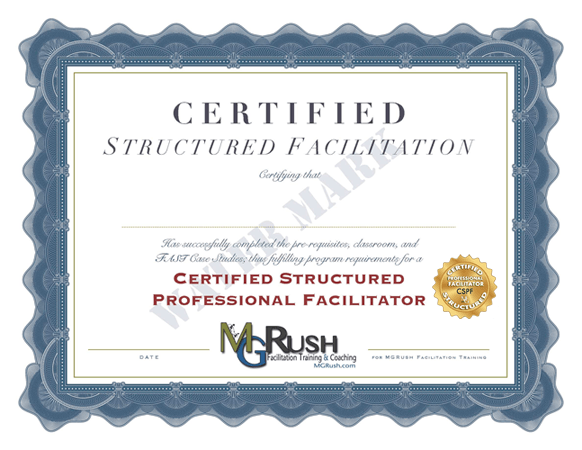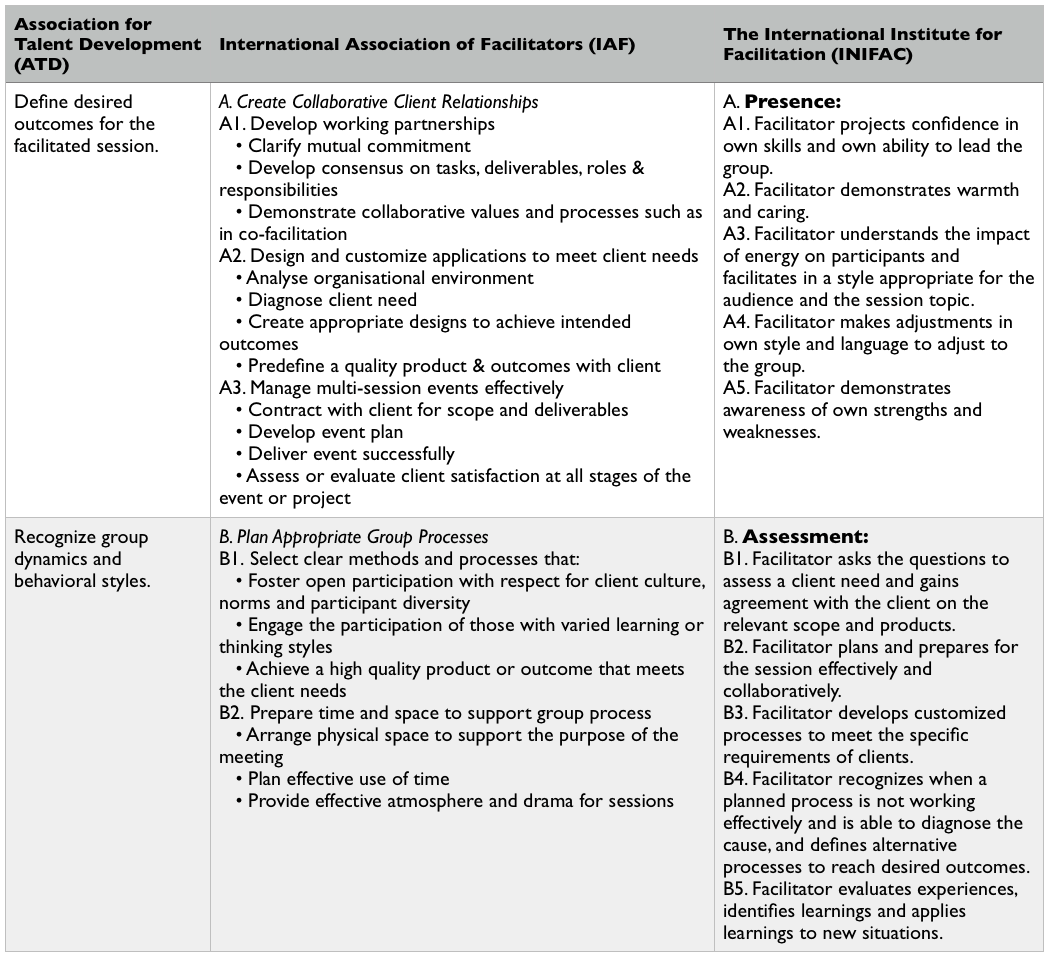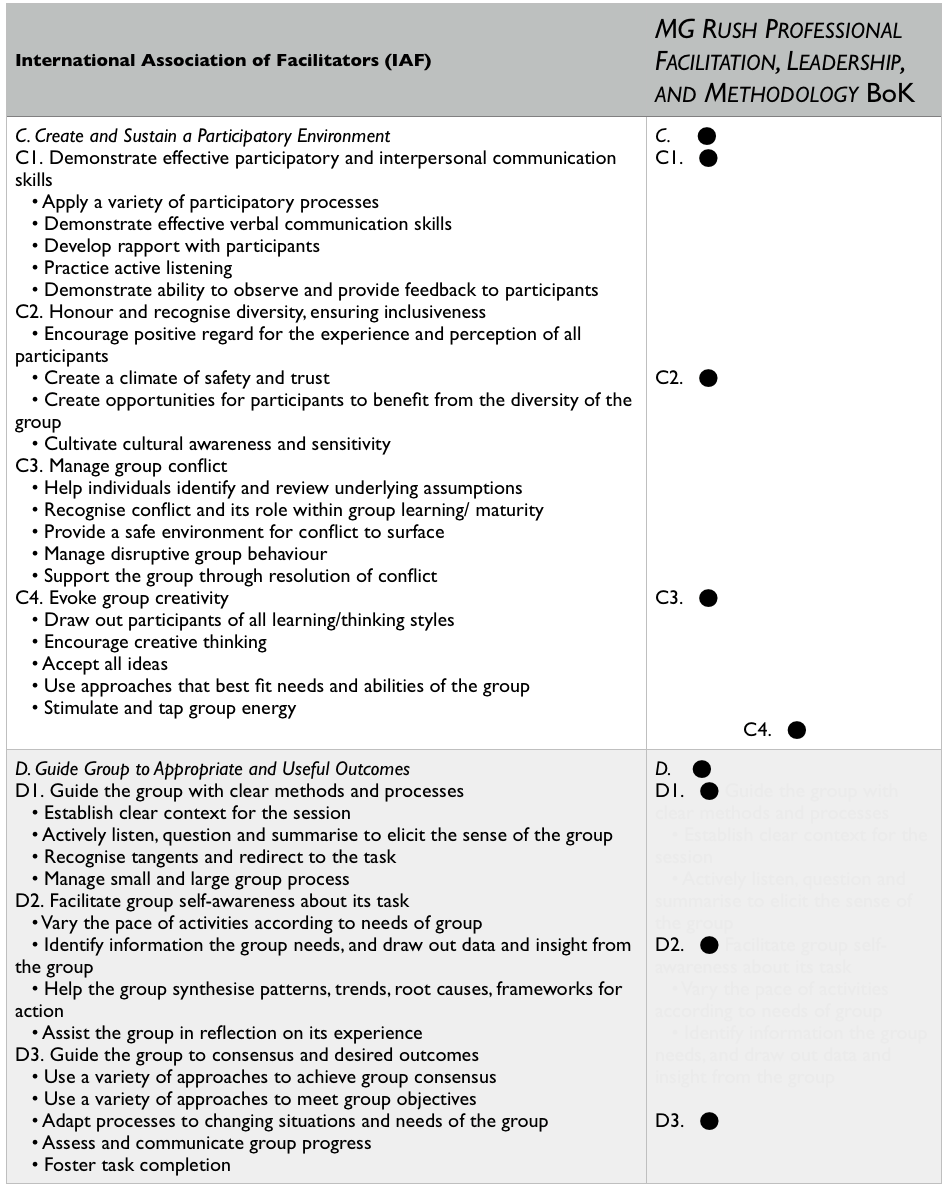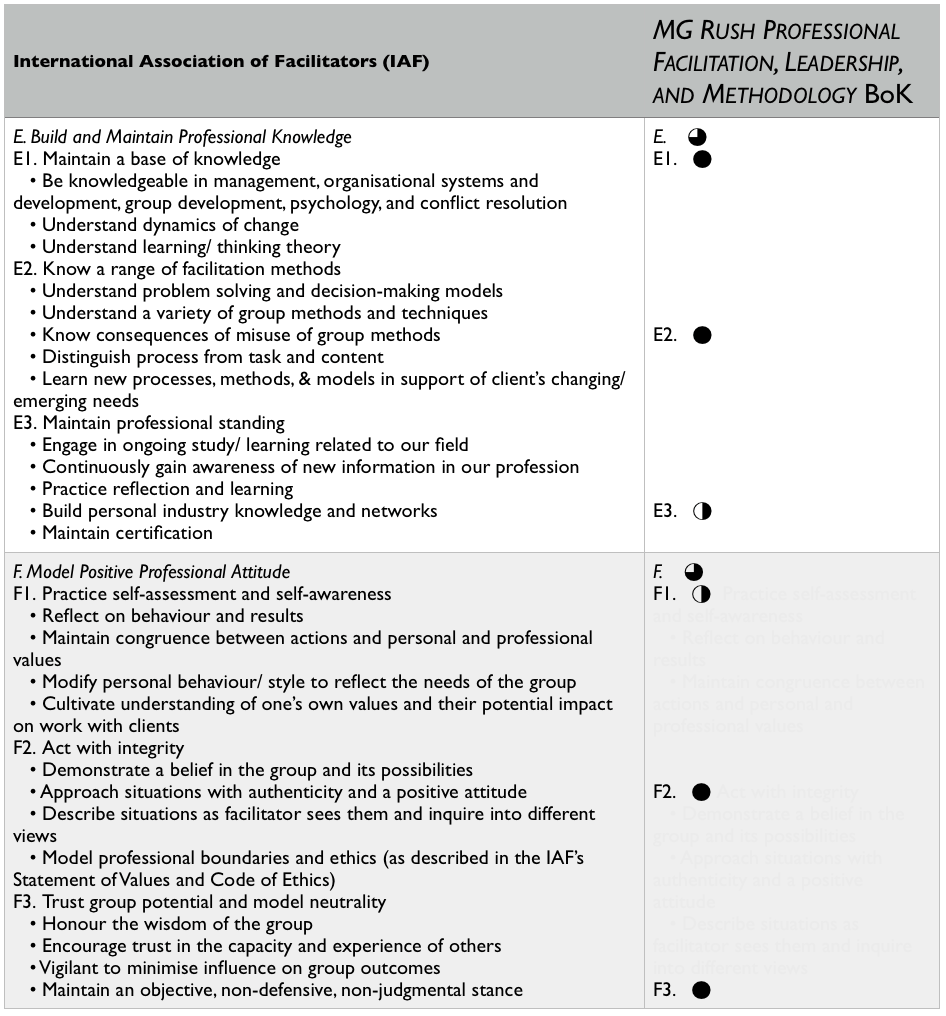With facilitation today there is no common, shared body of knowledge. In part, because facilitation is a fuzzy word and widely applied, there is no single definition — making Facilitation Certification fuzzy as well.
In North America, there are three primary methods for certifying professional skills and knowledge. None of the methods is necessarily superior or inferior when compared with each other.
- Association; e.g., Project Management Institute, Scrum Alliance, etc.
- Service Provider; e.g., Microsoft®, Oracle®, etc.
- University; e.g., Georgetown University, UCLA, etc.
First, consider the credibility of a facilitation certification:

Successfully complete a rigorous, five-day MG RUSH course to earn Certified Structured Professional Facilitator (CSPF) status, a premier facilitation certification
- Facilitation: The definition of the word facilitation is applied in many ways. There is no central body defining or controlling what facilitation is or where/ how it is applied. A search via Google or Bing returns many disparate uses of the term facilitation. Definitions range from facilitation among business groups, social groups, mediation, and dispute resolution, to teaching/instruction, community development, and many more.
At MGRUSH our instruction in facilitation supports all of the mentioned situations. Through a structured approach, we focus on business and organizational challenges, especially planning and understanding requirements. We cover workgroups, projects, executive sessions, board meetings, and workshops of all types and durations. - Certification: Most professional certifications include these elements:
-
- Body of knowledge (BoK), representing best practices and best of breed for industry standards
- Minimum level of practice with the certifiable skills and knowledge in appropriate, demonstration situations
- Test(s) or other repeatable, comparable, standards of the skill and knowledge being practiced
There are three global associations that provide certification focused exclusively on facilitation. They include the Association for Talent Development (ATD), the International Association of Facilitators (IAF), and the International Institute for Facilitation (INIFAC).
There is no central, unambiguous standard-setting agency. However, the IAF focuses its promotional efforts on the “core competencies” of facilitation. There are less than 500 IAF Certified Professional Facilitators (CPF), most of them outside of the USA. The INIFAC facilitation core competencies are quite similar but their requirements are more stringent. There are less than thirty INIFAC Certified Master Facilitators (CMF) worldwide in 2018.
The IAF Handbook of Group Facilitation published in 2005 provides a compendium of articles written by 30 authors, assembled around a set of core competencies. See the comparison charts below. Neither the IAF nor INIFAC provide facilitation training through their organization. Rather, they rely on outside experts such as ourselves to prepare students.
Related associations include the International Business Analyst’s Association (IBAA), Project Management Institute (PMI), and Scrum Alliance
Both the IAF and the INIFAC operate in a manner similar to the Project Management Institute (PMI), the International Business Analyst’s Association (IIBA), or similar associations. They provide a body of knowledge, and certification testing, and rely on Registered Educational Providers (REP) such as ourselves for training on the core competencies. Current BoK includes the Project Management Institute’s PMBok (Sixth Edition, 2017) and the International Business Analyst’s Association BABok (Third Edition, 2015). We rely partially on our certification and endorsement among these and other Associations as Registered Educational Providers to justify the certification of our robust curriculum and proven teaching methods.
For in-depth training on facilitation, students depend on the best efforts of commercial organizations (like ours), universities, and clubs/ associations. Frequently, the university certifications derive from trainers that also teach for us, or our competitors. No university can satisfy the rigorous requirements mentioned above (body of knowledge, testing, experience, requirements, etc.) without borrowing heavily on the knowledge codified by others, such as our MGRUSH Professional Facilitation curriculum, classroom immersion, practice, feedback, and testing.
Thousands of companies provide varying levels of certification for the products and services they provide. Motorola famously certified Green Belts, Black Belts, and Master Black Belts from its very own, Motorola University before the intellectual property for Six Sigma® was purchased by Underwriter’s Laboratories.
Microsoft®, Oracle®, and hundreds of others in the Information Technology space continue to provide certification by product type and role. Needless to say, a certain cachet derives from branded certification that exceeds that of independent associations that are not privy to all the working parts of proprietary solutions.
There are various clubs/ associations that promote facilitation (in any of its many meanings) as a means to build community and share tips and techniques. They generally promote whatever form of facilitation the local association/ club prefers.
Among commercial trainers, MGRUSH provides some of the most long-standing, recognized, and well-developed facilitation trainers and certifiers available. Our MGRUSH Professional Facilitation Reference Manual augments nearly one thousand documents, templates, and visual aids available online. Thus, our alumni instantly access our body of knowledge, downloading agendas, tools, and methods. The integrated resources contain contributions by the trainers, students, and others who are continuously testing in the field. We also apply a soft test to the usefulness of our certification by mentioning our training in students’ resumes. With our longevity and deep content, students frequently include our certification in their CVs and Biographical Sketches.
Discover how our structured form of facilitation creates amazing results, proven to make you a better leader.
The competencies gained from our rigorous training are inspirational and practical, you will love the results. For information on claiming your educational units for the IBAA, PMI, or Scrum Alliance click here.
For a comparison of the three Associations’ various core competencies for facilitation scroll down. We also demonstrate to what extent our MG RUSH Professional Facilitation curriculum covers the IAF core competencies. (MG RUSH does not provide IAF certification. Nor are we formally endorsed by IAF. For IAF certification guidelines, please visit their website.)
If you want, drop us a note and we’ll send you a table that compares over twenty facilitation certification organizations. We have compiled attributes such as:
- Facilitation certification class pricing ranges from USD$11,000 (Ten Directions®) to $200 (Lego® Education)
- Facilitation certification class durations range from one day (various) to sixteen days (UCLA—plus offsite reading and exercises).
______
Don’t ruin your career by hosting bad meetings. Sign up for a workshop or send this to someone who should. MGRUSH workshops focus on meeting design and practice. Each person practices tools, methods, and activities daily during the week. Therefore, while some call this immersion, we call it the road to building high-value facilitation skills.
Our workshops also provide a superb way to earn up to 40 SEUs from the Scrum Alliance, 40 CDUs from IIBA, 40 Continuous Learning Points (CLPs) based on Federal Acquisition Certification Continuous Professional Learning Requirements using Training and Education activities, 40 Professional Development Units (PDUs) from SAVE International, as well as 4.0 CEUs for other professions. (See workshop and Reference Manual descriptions for details.)
Want a free 10-minute break timer? Sign up for our once-monthly newsletter HERE and receive a free timer along with four other of our favorite facilitation tools.
______
With Bookmarks no longer a feature in WordPress, we need to append the following for your benefit and reference
- 20 Prioritization Techniques = https://foldingburritos.com/product-prioritization-techniques/
- Creativity Techniques = https://www.mycoted.com/Category:Creativity_Techniques
- Facilitation Training Calendar = https://mgrush.com/public-facilitation-training-calendar/
- Liberating Structures = http://www.liberatingstructures.com/ls-menu
- Management Methods = https://www.valuebasedmanagement.net
- Newseum = https://www.freedomforum.org/todaysfrontpages/
- People Search = https://pudding.cool/2019/05/people-map/
- Project Gutenberg = http://www.gutenberg.org/wiki/Main_Page
- Scrum Events Agendas = https://mgrush.com/blog/scrum-facilitation/
- Speed test = https://www.speedtest.net/result/8715401342
- Teleconference call = https://youtu.be/DYu_bGbZiiQ
- The Size of Space = https://neal.fun/size-of-space/
- Thiagi/ 400 ready-to-use training games = http://thiagi.net/archive/www/games.html
- Visualization methods = http://www.visual-literacy.org/periodic_table/periodic_table.html#
- Walking Gorilla = https://youtu.be/vJG698U2Mvo

Terrence Metz, president of MG RUSH Facilitation Training, was just 22-years-old and working as a Sales Engineer at Honeywell when he recognized a widespread problem—most meetings were ineffective and poorly led, wasting both time and company resources. However, he also observed meetings that worked. What set them apart? A well-prepared leader who structured the session to ensure participants contributed meaningfully and achieved clear outcomes.
Throughout his career, Metz, who earned an MBA from Kellogg (Northwestern University) experienced and also trained in various facilitation techniques. In 2004, he purchased MG RUSH where he shifted his focus toward improving established meeting designs and building a curriculum that would teach others how to lead, facilitate, and structure meetings that drive results. His expertise in training world-class facilitators led to the 2020 publication of Meetings That Get Results: A Guide to Building Better Meetings, a comprehensive resource on effectively building consensus.
Grounded in the principle that “nobody is smarter than everybody,” the book details the why, what, and how of building consensus when making decisions, planning, and solving problems. Along with a Participant’s Guide and supplemental workshops, it supports learning from foundational awareness to professional certification.
Metz’s first book, Change or Die: A Business Process Improvement Manual, tackled the challenges of process optimization. His upcoming book, Catalyst: Facilitating Innovation, focuses on meetings and workshops that don’t simply end when time runs out but conclude with actionable next steps and clear assignments—ensuring progress beyond discussions and ideas.






